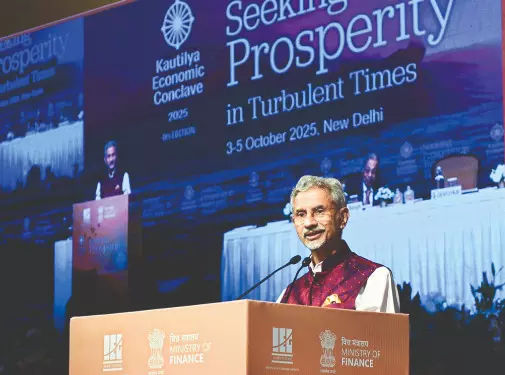India’s ‘red lines’ have to be respected: EAM Jaishankar on trade deal with US

New Delhi: Any trade agreement between India and the United States must respect New Delhi’s “red lines”, External Affairs Minister S. Jaishankar said on Sunday, signalling ongoing efforts to reach a mutual understanding amid tensions over tariffs.
Speaking at the Kautilya Economic Enclave during an interactive session on “Shaping Foreign Policy in Turbulent Times”, Jaishankar acknowledged that issues persist between the two countries, with much of the strain stemming from stalled trade negotiations. “There are things you can negotiate, and there are things you can’t,” he noted, stressing the importance of safeguarding India’s core interests.
The bilateral relationship has been under stress since August, when US President Donald Trump doubled tariffs on Indian goods to 50 per cent. This included a 25 per cent additional duty on India’s purchase of Russian crude oil, a move India had described as “unfair, unjustified and unreasonable”. Jaishankar said that while both sides have yet to find a “landing ground” on trade discussions, reaching an understanding remains essential given that the US is the world’s largest market. He added that India is clear about its approach. “We have to find that landing ground, and that’s been the conversation going on since March,” he said.
He also highlighted that the second tariff, specifically targeting India for sourcing energy from Russia, was particularly unfair. “This has picked on us for sourcing energy from Russia when there are other countries that have done so, including countries that right now have a far more antagonistic relationship with Russia than we do,” Jaishankar said.
Despite the disagreements, Jaishankar suggested that not every aspect of the India-US engagement has been affected. “There are problems, there are issues, nobody is in denial of it. Those issues need to be negotiated and discussed and resolved, which is exactly what we are trying to do,” he said. He added that a significant part of the relationship continues as business as usual, and in some cases, even more robustly than before.
The minister’s comments came as India and the US recently resumed negotiations on a proposed trade deal following a short hiatus. Earlier discussions had encountered obstacles, particularly in critical areas such as agriculture and dairy, preventing a final agreement.
“Whatever happens at the end of the day, there has got to be a trade understanding with the US, because much of the world has reached those understandings,” Jaishankar said. He stressed, however, that any deal must respect India’s bottom lines.
Beyond trade, Jaishankar delved into the broader geopolitical landscape, describing the current era as an “extraordinary and intense period of change.” He pointed to the weakening of international regimes and rules, as well as shifts in economic priorities, where cost is no longer the sole consideration. “Ownership, security, reliability, resilience—these are equally important,” he said.
Jaishankar also highlighted the growing global competition for rare earths and critical minerals, describing it as a “major factor” influencing politics and economics. He noted that this competition creates a paradoxical scenario: it encourages higher risk-taking while simultaneously prompting efforts to de-risk every facet of global activity.
In a likely reference to China, he flagged concerns about the concentration of global manufacturing in a single country. “We have seen politically that alliances and understandings are being revisited. We’ve also seen in a few cases, in the cases of really major polities, that their belief in the balance of power is probably much less,” he said.
On finance and sanctions, Jaishankar remarked that recent years have witnessed unprecedented measures, including the seizure of sovereign assets. He underscored that India must not only defend its existing position but also continue its trajectory of growth. “For us, just defending what we have is simply not good enough. This has caught us at a time where we had to not only internalise and absorb these risks, but find a way of going beyond and continuing with our rise,” he said.
The minister further discussed the changing nature of warfare, citing recent conflicts in Azerbaijan-Armenia, Ukraine-Russia, and Israel-Iran. He observed that contactless war using stand-off weapons has become possible and can produce decisive outcomes, reflecting shifts in modern military strategy.



